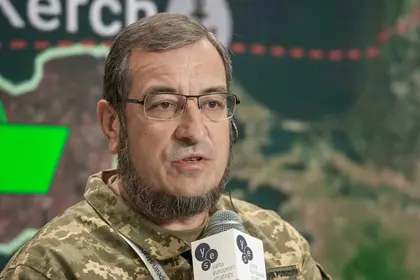Ukraine’s military intelligence service (HUR) deputy chief spoke in an interview with The Economist about upcoming difficulties for Ukraine in Donbas and the Kremlin’s threat to NATO’s Baltic nations.
Vadym Skibitsky, Budanov’s deputy at the HUR, talked about the possibility of Ukraine losing Chasiv Yar and cautioned that May could a difficult month for Ukrainians, with possible Russian gains if it launches offensives in the East.
JOIN US ON TELEGRAM
Follow our coverage of the war on the @Kyivpost_official.
Kyiv Post collected the top five main points in Skibitsky’s statements.
1.) “Losing Chasiv Yar is only a matter of time”
Russia is trying to implement a plan for its so-called complete “liberation” of the Donetsk and Luhansk regions. He said the Kremlin has ordered its forces to “take something” by Victory Day on May 9 or before Putin’s visit to China a week later.
According to Skibitsky, the loss of the town of Chasiv Yar, which is a key to the Russian advance to the last major towns in the Donetsk region, is a matter of time.
“Not today or tomorrow, of course, but all depending on our reserves and supplies,” said Skibitsky.
2.) Moscow’s “three-layered” destabilization plan
In May, Russia plans to target three spheres to destabilize Ukraine, Skibitsky said.
The main limiting sphere is in Kyiv’s arsenal. Despite the approval of US military aid, the weapons themselves will take weeks to reach Ukrainian frontline positions. According to Skibitsky, once they arrive on the battlefield these weapons are unlikely to match Russia’s stockpile of shells or provide effective protection against the Kremlin’s low-tech, destructive glide bombs.

North Korean Forces in Kursk Could Be Completely Destroyed by April 2025
The second sphere is Russia’s disinformation campaign in Ukraine aimed at undermining President Volodymyr Zelensky’s mobilization plan and political legitimacy. The term of office of the President of Ukraine formally expires on May 20, but the Constitution allows for its indefinite extension in wartime.
The third sphere is Russia’s unrelenting campaign to isolate Ukraine internationally.
3.) Skibitsky said such wars can only end with negotiations
Skibitsky believes that Ukraine cannot defeat Russia on the battlefield alone. Even if it were able to push Russian troops back to the borders – which he thinks is an increasingly remote prospect – it would not end the war. Such wars can only end with treaties, he says.
According to Skibitsky, both sides are now trying to obtain the “most favorable position” ahead of potential negotiations, but meaningful talks may not begin until the second half of 2025. Until then, Russia will face serious headwinds.
Russian military production capacity has expanded but will reach a plateau in early 2026 due to a lack of materials and engineers, Skibitsky said. According to him, both sides may eventually face a shortage of weapons, “but if nothing changes, Ukraine will run out first.”
4.) Skibitsky said Russia could take the Baltic states in seven days
If Ukraine’s partner countries don’t find a way to increase defense production to help Ukraine, they too will eventually be in Russia’s crosshairs.
Skibitsky downplays the importance of Article 5 of NATO’s collective defense and even the presence of NATO troops in countries bordering Ukraine.
“The Russians will capture the Baltic States in seven days. NATO’s reaction time is ten days,” Skibitsky said.
He said that Ukraine’s bravery and sacrifice have given Europe a multi-year head start, eliminating the immediate threat of the once-thought fearsome Russian airborne troops and marines for at least a decade.
Now, according to Skibitsky, the question is whether Europe will return the favor and keep Ukraine in the game, The Economist writes.
“We will keep fighting. We have no choice. We want to live. But the outcome of the war… isn’t down to just us.”
5.) Russia is preparing an offensive in the Kharkiv and Sumy regions
Russia is currently preparing for an offensive in the Kharkiv and Sumy regions in northeastern Ukraine. The realization of these plans depends on the resilience of the Ukrainian defense in Donbas. The main attack will begin “in late May or early June,” Skibitsky said.
The Russian forces have deployed 514,000 troops in the Ukrainian operation. The northern grouping, based across the border from Kharkiv, has 35,000 troops, but it is planned to expand to 50-70,000.
According to Skibitsky, the Russian Defense Ministry is also “forming a reserve division” (15 to 20,000 people) in central Russia, which could be added to the main forces.
However, he said this is “not enough” for an operation to capture a large city. The Economist said that the Western military shares the same opinion. However, smaller-scale operations are possible.
“A quick operation to come in and come out: maybe,” said Skibitsky. “But an operation to take Kharkiv, or even Sumy city, is of a different order. The Russians know this. And we know this.”
You can also highlight the text and press Ctrl + Enter










